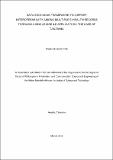| dc.description.abstract | Electronic Health (eHealth), particularly in the form of electronic health records (eHRs), has proved to greatly provide to the health sector, a number of benefits such as real time receipt of health-care information and timely addresses health issues. However, many of the eHRs are fragmented as such they face some operational challenges, one of which is eHRs interoperability. The interoperability is caused by lack of architectural guidelines toward eHRs development, and poor collaboration among eHRs development vendors to mention a few. Early efforts to interoperate eHRs suggest that a single mobile app that can access multiple integrated eHRs is among the viable solutions on the way to eHRs interoperability. The research work reported in this dissertation focused to support sharing of information among different eHRs through a single mobile app by creating a data exchange framework. Tanzania as a case study was used to survey issues and challenges facing mobile apps development process when developing mobile app solution for eHRs interoperability. A preliminary study was conducted in mobile app development environment and it was established that the developers have no unified development process to connect multiple databases/repositories. Interviews, questionnaires, and observation were used as data collection tools in two different regions in Tanzania namely; Dar es Salaam and Arusha. The interoperability issues and challenges identified by the survey revealed a demand from mobile app developers of a single mobile app connection to multiple integrated eHRs. The main objective of the reported work was to satisfy this demand - a mobile app connecting to multiple eHRs. As a result, a new Mobile App – Data Exchange Framework (MADE-Framework) has been developed and a prototype implemented and evaluated by mobile app developers and the health practitioners. The framework incorporates a Data Exchange Component (DEC), essentially an exchange engine, acting as its core data exchange and access control mechanism to facilitate data and information sharing among multiple eHRs. The DEC Architecture can integrate multiple eHRs to interoperate and extends the capability into a single mobile app. It involves Open Health Information Mediator (OpenHIM) and MEDIATOR as sub-components to facilitate the data and information sharing mechanism. Based on the evaluation tests, the DEC has successfully proved to connect a single mobile app to multiple eHRs. Therefore, the new MADE framework is a new approach to utilize legacy and newly implemented eHRs without much worry on obsoleteness of database technologies. In this way it will protect investments and providing business continuity within the evolving eHRs. | en_US |

